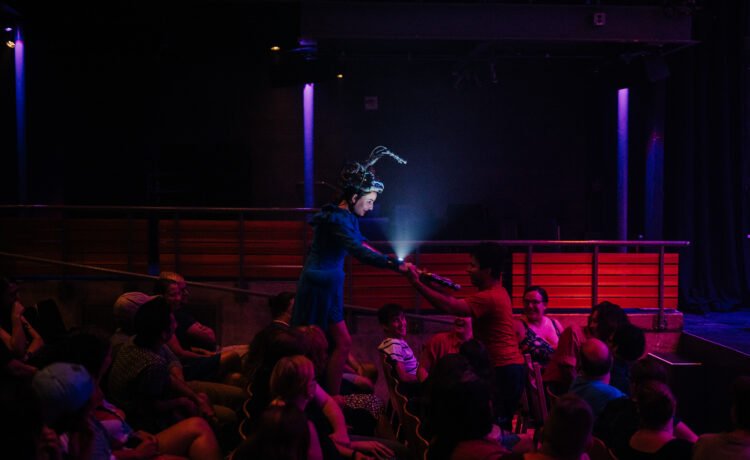“I’m in love with my co-worker, and I don’t know how to tell them.” “I want to propose to my partner, and I don’t know how.” “I’m worried about my children.” “I recently lost a parent.” “I feel like I’m running out of time.” It was not unusual to hear such sentiments spoken aloud under Masli’s watchful direction. It was, however, surprising to witness such candid vulnerability at this event, which was ostensibly branded as a comedy show. However, this clown clearly has no interest in separating the art from the audience—not just by inviting audience members onto the stage, but by encouraging them to take elements of the performance with them as they leave. Some may even leave a part of themselves behind. In doing so, she successfully coaxes audiences into disclosing their most immediate concerns and at times their deepest vulnerabilities.
For instance (and this is by no means a catch all summary of any given evening’s events): expressing a desire to spend more time with friends frequently results in audience members physically duct-taped to other audience members. Hunger could be aptly remedied by a pizza and salad falling from the rafters. Those who express fatigue can rest assured of a place to rest their heads on stage. Those who are lonely might be connected with other audience members—or, if they should be so fortunate, invited to go bowling with Masli (which many audience members did during the final weekend of her stay in Washington, DC.) Each night, Masli coaxes an audience volunteer to pass around a plastic garbage bag in which they will collect an individual sock from any willing audience member. The socks, according to Masli, are a symbolic offering to rid audience members of any evil they carry with them. They were burned in Malcolm X Park at 3:00 a.m. on 4 August, the last day of Masli’s Washington, DC run. According to social media reports, there was quite a turnout.
I recognized a collectivist energy among audience members that can sometimes feel absent from other productions.
As a member of the Woolly Mammoth staff, I had the opportunity to observe her process, and after the close of the run, I called Masli myself to learn more about her problem-solving capabilities and the many reasons we should take laughter just a bit more seriously. I asked her how she managed to achieve such remarkable balance between dramatic theatre and improvisational clowning. Masli revealed that she aspired to be an actor from a young age. The thing is, she didn’t totally love most of the more “traditional” dramas she was exposed to. She explains:
I loved when people gathered together in a room, and I loved the moment before a show was about to start—the anticipation, the buzz—but it was rare that I actually enjoyed the show. I convinced myself that I loved it, even though I didn’t understand a lot of it. The theatre I saw was very text heavy, and my English was not good at the time. But I still convinced myself I loved it.
Later in life, Masli trained with Complicité in England. Finding their work “very collaborative, very alive, very playful, very visual,” she took workshops with Complicité until eventually enrolling full-time at the Ecole Philippe Gaulier. Masli excelled and graduated, only to find herself knee-deep in London’s stand-up comedy circuit despite feeling more drawn to the playful, movement-based techniques of Gaulier. She explains that despite performing in comedy venues “people always retorted ‘that’s clowning,’ and so I said, ‘sure, let’s go with that.’” She adds that she is “not precious about clowning,” nor does she think anyone should be.
When it comes to ha ha ha ha ha ha ha, the “problem” motif emerged by accident. While touring a different show, Masli prematurely booked a solo-performance at a London dive-bar called Bill Murray, but the deadline snuck up on her sooner than expected. Without a pre-established script or even a bit to rely on, Masli improvised a character that would morph into the steam-punk’ed optimist audiences meet during ha ha ha ha ha ha ha. She humbly admits, “That’s often how I make stuff. I just book it and panic afterwards. It’s the only way to get me to get me going.”








Recent Comments